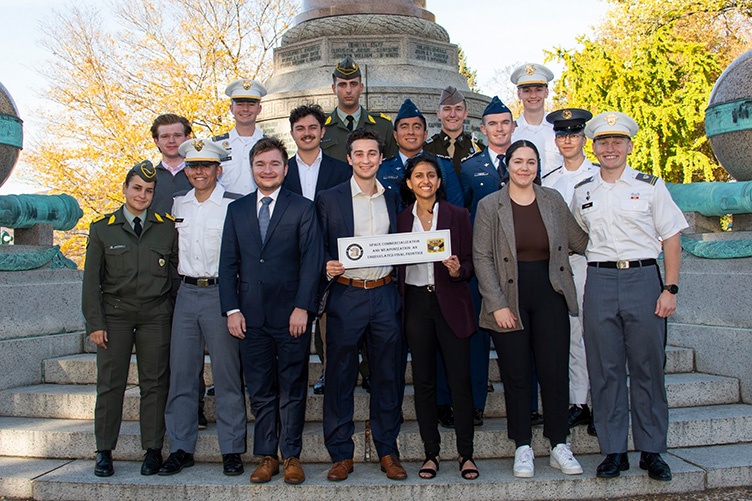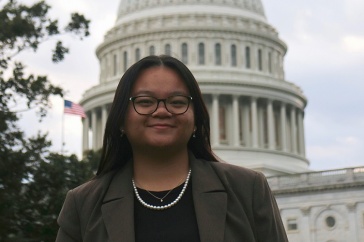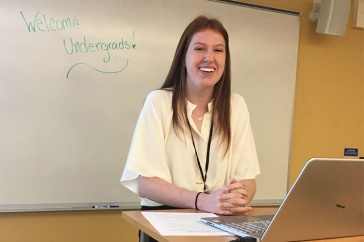
James Ackerman (pictured at left in middle row) with other members of the space commercialization and weaponization roundtable at the Student Conference on U.S. Affairs.
Space is getting crowded. There are over 5,400 satellites above us, from both public and private sectors, plus a sea of debris from satellite explosions. Civilians are starting to hitch rocket rides with SpaceX and other companies. New technologies to harness space resources might someday impact the energy landscape on Earth. And states are weaponizing space. Amid this growth, the U.S. faces a challenge: how can it maintain its safety and competitive edge?
That’s the challenge that James Ackerman ‘23 tackled at the 73rd annual Student Conference on U.S. Affairs (SCUSA), a four-day event hosted by The United States Military Academy at West Point in November. He was assigned to the space commercialization and weaponization roundtable, one of 16 topics discussed at the gathering. Each roundtable developed a policy proposal for the U.S. government that addresses key strategic issues in America’s foreign policy.
Ackerman’s team recommended three actions pertaining to space challenges: in short, that the U.S. pursue multilateral space regulation, that the U.S. build public-private partnerships for technology to trace space weapon attacks, and that the U.S. demonstrate its counterspace abilities to build deterrence. The details are in the published proposal.

Ackerman, a political science major, says the experience working with cadets and students interested in policymaking was incredible. Plus, he had the opportunity to learn from presentations by Linda Thomas-Greenfield, the U.S. ambassador to the United Nations, and other officials and policymakers.
“Getting a small glimpse into how the United States addresses challenges and being able to do it with others to build those relationships is something I won’t forget. I am insanely grateful to have gotten to meet and work with so many talented people,” says Ackerman, whose participation was funded, in part, by donor gifts supporting student experiences in political science.
After graduating from UNH, Ackerman plans to attend graduate school in a security studies program, focusing on emerging technologies and their impact on security, governance and international relations.
“My SCUSA roundtable topic addressed all of these areas, so it was great to gain some hands-on experience in this area of policymaking,” he says.
Ackerman was recommended for SCUSA by Jen Spindel, assistant professor of political science and the UNH contact for conferences at the military academies. UNH is invited to send one student to SCUSA, and Ackerman fit the bill.
“James was an excellent candidate based on his coursework in international security-related classes, his interest in applying his research to policy decisions and his interest in attending graduate school,” says Spindel. “I was also confident that James would be an excellent representative of UNH.”
Spindel says the SCUSA conference is particularly valuable for those interested in international and foreign policy because of the way students wrestle with real and current policy issues.
“SCUSA is also an opportunity for civilian and military college students to learn from one another,” she says. “In an era where we see an increasing gap between those with military service and those without, these points of contact and interaction like SCUSA are increasingly important.”
“Sending a student to the conference also reinforces our efforts to grow the program in international security studies at UNH,” Spindel notes. “We are always thrilled to have the opportunity to show off our excellent students, and SCUSA is one of the events that helps maintain our reputation as a university that uses faculty research expertise to provide unique experiences for students.”
-
Written By:
Susan Dumais '88 '02G | College of Liberal Arts




















































